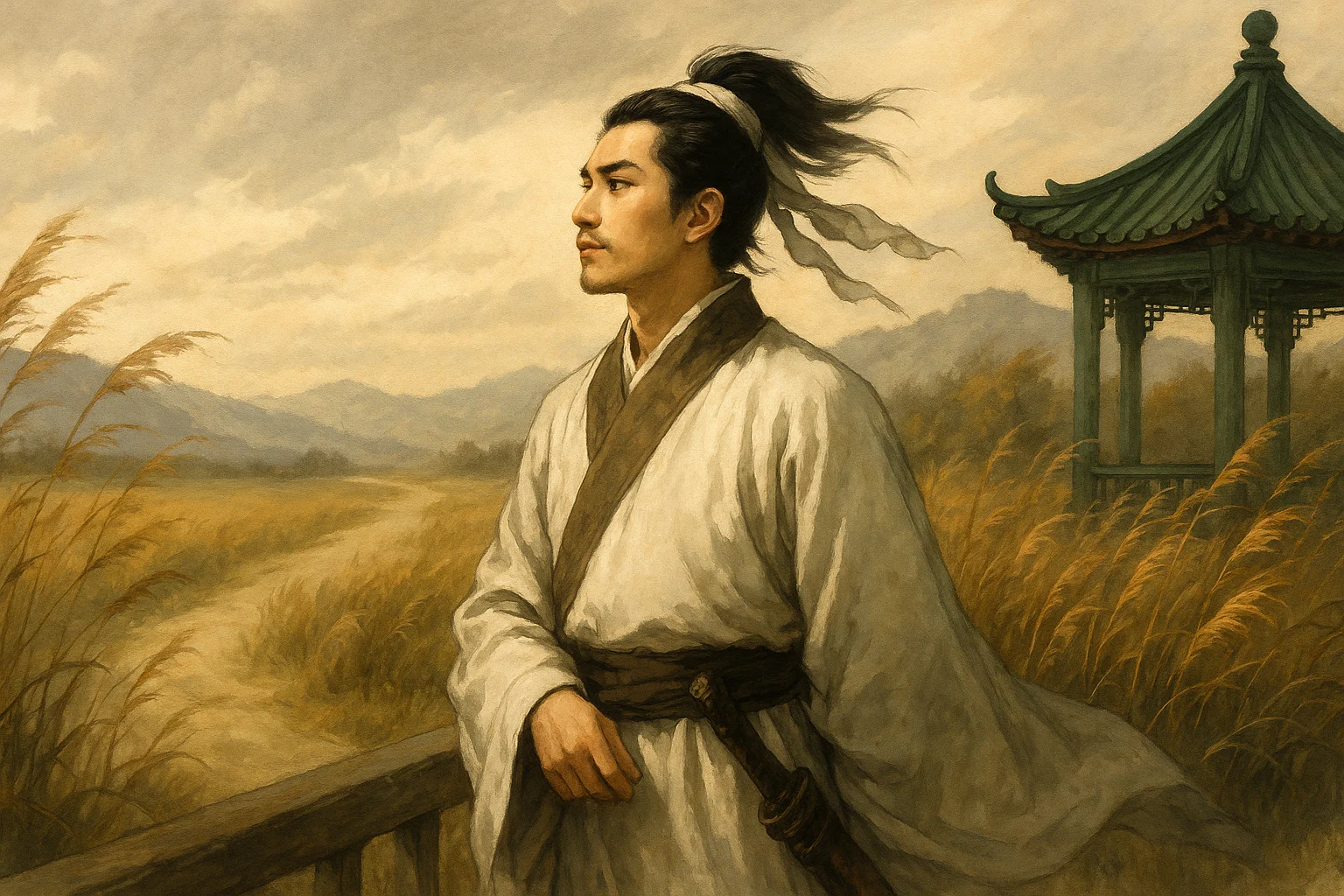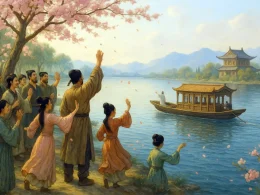They say that wildgeese, flying southward,
Here turn back, this very month...
Shall my own southward journey
Ever be retraced, I wonder?
...The river is pausing at ebb-tide,
And the woods are thick with clinging mist --
But tomorrow morning, over the mountain,
Dawn will be white with the plum-trees of home.
Original Poem
「送别杜审言」
宋之问
卧病人事绝,嗟君万里行。
河桥不相送,江树远含情。
别路追孙楚,维舟吊屈平。
可惜龙泉剑,流落在丰城。
Interpretation
This poem was composed by Tang Dynasty poet Song Zhiwen as a heartfelt farewell to his friend Du Shenyan, who was exiled due to political persecution. Bedridden by severe illness and unable to bid farewell in person, Song expresses both compassion for his friend's plight and sorrow over their shared fate. Blending classical allusions with lyrical imagery, the verses convey profound parting emotions while reflecting on the injustice suffered by talented individuals.
First Couplet: "卧病人事绝,嗟君万里行。"
Wò bìng rénshì jué, jiē jūn wànlǐ xíng.
Bedridden, I'm cut off from human affairs; Sighing as you embark on ten-thousand-mile cares.
The opening establishes dual tragedies: the poet's physical confinement ("bedridden") and his friend's metaphorical exile ("ten-thousand-mile"). The sigh ("嗟") bridges personal suffering with shared sorrow, creating an intimate yet universal lament.
Second Couplet: "河桥不相送,江树远含情。"
Hé qiáo bù xiāng sòng, jiāng shù yuǎn hán qíng.
No farewell by riverbridge can I make; Distant trees on banks my longing take.
Nature becomes an emotional proxy where human presence fails. The unvisited "riverbridge" (traditional parting spot) contrasts with sentient "trees" that "hold longing," transforming landscape into a silent witness to unexpressed grief.
Third Couplet: "别路追孙楚,维舟吊屈平。"
Bié lù zhuī Sūn Chǔ, wéi zhōu diào Qū Píng.
Your path recalls Sun Chu's exile grim; My anchored boat mourns Qu Yuan's hymn.
Historical parallels deepen the lament: Sun Chu (晋朝 outspoken official) and Qu Yuan (wronged poet-statesman) symbolize the recurring tragedy of integrity punished. The "anchored boat" suggests the poet's immobilized state while connecting to Qu Yuan's river suicide.
Fourth Couplet: "可惜龙泉剑,流落在丰城。"
Kěxī Lóngquán jiàn, liúluò zài Fēngchéng.
How grieves the Dragon Spring Sword's might, Buried in Fengcheng, far from light!
The legendary Longquan Sword (buried then rediscovered) becomes a metaphor for suppressed talent. While lamenting its "burial," the allusion inherently carries hope - as the sword was eventually recovered, so may Du's brilliance be recognized again.
Holistic Appreciation
This poem, ostensibly about farewell, carries profound political and existential contemplation. The ailing poet pens his deep concern for a banished friend with remarkable linguistic economy, blending personal affection with acute awareness of turbulent times. The skillful use of historical allusions elevates the philosophical depth, while natural imagery intensifies the emotional resonance. The concluding metaphor of the "buried dragon-spring sword" laments both his friend's fate and his own predicament, leaving a lingering, poignant aftertaste.
Artistic Features
- Layered Emotional Progression
The poem begins with "bedridden, cut off from human affairs," explaining the poet's inability to bid farewell personally, then moves to "alas, your thousand-mile journey" expressing regret. "No farewell at the river bridge, distant trees brimming with feeling" paints the scene of forced separation, while "recalling Sun Chu on your path, mourning Qu Yuan by moored boat" elevates the moment to historical parallel. The climax comes with "how regrettable - the dragon-spring sword lies buried at Fengcheng," where personal sorrow transforms into a universal lament about unrecognized talent. - Concise yet Profound Language
In just twenty-eight characters, the poem achieves remarkable emotional density. Direct expressions of grief alternate with allusive depth, each line standing independently yet contributing to the whole. The work simultaneously performs farewell rites and voices political concern through perfectly balanced tension. - Exquisite Psychological Depiction
The exclamation "alas" reveals the poet's inner turmoil; "brimming with feeling," "recalling Sun Chu" and "mourning Qu Yuan" externalize complex emotions; while the final sword metaphor crystallizes compassionate indignation into one devastating image, demonstrating extraordinary empathetic insight and artistic control.
Insights
This work teaches that genuine human connection transcends physical limitations, and that profound emotion finds most powerful expression through indirect means - historical analogy and natural symbolism. It also affirms the enduring value of talent and integrity even in adversity, suggesting that true worth may eventually emerge from obscurity, just as legendary swords are rediscovered. The poem ultimately transforms personal grief into a meditation on justice and recognition that resonates across centuries.
Poem translator
Xu Yuanchong (许渊冲)
About the Poet

Song Zhiwen (宋之问, 656 – 712 CE), a native of Fenyang, Shanxi (some records suggest Lingbao, Henan). Song Zhiwen attained the jinshi degree in 675 CE. In 708 CE, he was reassigned as Vice Director (yuanwailang) of the Bureau of Evaluations (kaogong) and appointed an Academician of the Institute for the Advancement of Literature alongside Du Shenyan and Xue Ji, only to be demoted again to Vice Prefect (changshi) of Yuezhou for accepting bribes. In 710 CE, Song Zhiwen was exiled to Qinzhou, and Emperor Xuanzong ordered his execution in 712 CE.











